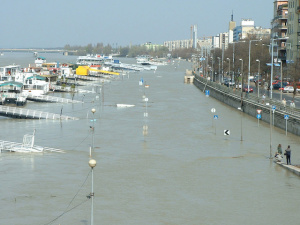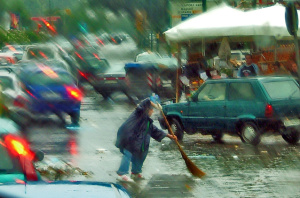by Ross Hunter
Nature, at its best, can often provide us with a sense of almost unparalleled well-being. At its worst, it can reduce us to panic-stricken animals, scrambling to maintain a life we thought was safe from something as regularly mundane as the weather. This winter, the harsher side of nature reared its head.
Whenever something as damaging (and expensive) as mass flooding occurs there are always a variety of opinions about what specific solutions should be implemented by the Government. In the case of flooding this could, perhaps, be summed-up with a single question: To dredge or not to dredge?
 Firstly, it might be helpful to provide a short description of what dredging actually is, and its environmental effects. The definition provided by the Chartered Institution of Water and Environmental Management (CIWEM)—a professional body that conducts independent research into water and environmental management in the UK. They state that dredging is ‘the systematic removal of accumulated material from river and other watercourse channels’. They also go onto say that, in its most extreme form, dredging can be defined as the practice of re-aligning rivers to create ‘linear, canalised watercourses. Basically, dredging is the practice of scouring riverbeds of all obstruction (and, as a consequence, life) and straightening watercourses so that water flows from its source to the sea in as direct a route as possible.
Firstly, it might be helpful to provide a short description of what dredging actually is, and its environmental effects. The definition provided by the Chartered Institution of Water and Environmental Management (CIWEM)—a professional body that conducts independent research into water and environmental management in the UK. They state that dredging is ‘the systematic removal of accumulated material from river and other watercourse channels’. They also go onto say that, in its most extreme form, dredging can be defined as the practice of re-aligning rivers to create ‘linear, canalised watercourses. Basically, dredging is the practice of scouring riverbeds of all obstruction (and, as a consequence, life) and straightening watercourses so that water flows from its source to the sea in as direct a route as possible.
On first sight the logic of dredging is apparent. By allowing water to flow from its source to the sea in a straight line and without ‘obstruction’ then that means there is less chance of it ending up in our living rooms, right? Sadly, it just isn’t that simple.
Dredging isn’t a terribly easy thing to do. It involves machinery, manpower, money and repetition—after a while all that ‘accumulated material’ accumulates once again. It simply isn’t feasible, both financially and in terms of engineering, to dredge the entirety of river. Instead local authorities and farmers can only dredge small portions of a river and its various tributaries. This is where dredging begins to look troublesome. While those living near a dredged watercourse may escape flooding due to the increased water flow passing through their stretch of river in record time, those further downstream suffer the consequences of such a speedy influx. Locally it may be useful, but nationally the consequences are disastrous: the towns and cities further downstream from dredged riverbeds will always be the ones to suffer. As a CIWEM report on the subject states: ‘dredging cannot hope to prevent flooding caused when heavy rainfall results in flows that vastly exceed the capacity of a river channel’. In short, dredging isn’t necessarily the answer to Britain’s flood defence crisis.
 Liz Truss—the Secretary of State for the Environment, Food and Rural Affairs and therefore the woman responsible for putting together a long-term flood defence strategy for the UK—doesn’t seem to see dredging as problematic, despite the previously discussed evidence provided. At a recent speech given at the annual Oxford Farming Conference she announced that her government will soon ‘allow farmers across the country to maintain ditches of up 1.5km long from April, so they can dredge and clear debris and manage the land to stop it getting waterlogged’. This policy—soon to be enacted in the interests of ‘getting rid of unnecessary red tape’—is dangerous. It will allow farmers to protect their fields (which often act as floodplains during increased rainfall) by dredging the stretches of river on their land, thus increasing the risk to communities downstream. Of course, for farmers a flooded field means a loss of profit. However, surely it is better to allow uninhabited land to flood rather than let that water flow to the cities downstream causing, as it did this year, enormous amounts of damage and suffering. Arguably, sometimes red tape is necessary if the interests of the many are to be placed before the profits of the few.
Liz Truss—the Secretary of State for the Environment, Food and Rural Affairs and therefore the woman responsible for putting together a long-term flood defence strategy for the UK—doesn’t seem to see dredging as problematic, despite the previously discussed evidence provided. At a recent speech given at the annual Oxford Farming Conference she announced that her government will soon ‘allow farmers across the country to maintain ditches of up 1.5km long from April, so they can dredge and clear debris and manage the land to stop it getting waterlogged’. This policy—soon to be enacted in the interests of ‘getting rid of unnecessary red tape’—is dangerous. It will allow farmers to protect their fields (which often act as floodplains during increased rainfall) by dredging the stretches of river on their land, thus increasing the risk to communities downstream. Of course, for farmers a flooded field means a loss of profit. However, surely it is better to allow uninhabited land to flood rather than let that water flow to the cities downstream causing, as it did this year, enormous amounts of damage and suffering. Arguably, sometimes red tape is necessary if the interests of the many are to be placed before the profits of the few.
So, what do critics of dredging suggest? There is no single answer to that question, but the scientists and hydrologists of this country have a few ideas.
One option: less sheep and more trees. Grazing sheep on hillsides allows them to trample the ground beneath their feet into a hard, largely impregnable surface. During periods of increased rainfall the water, instead of being absorbed into the ground and thus alleviating the amount of water in the rivers, slides right over the top and into the nearest stream. If those sheep were to be replaced with trees however (namely native deciduous woodlands) then a great deal of the water would be absorbed into the ground instead of heading straight to the nearest brook. A 2013 scientific study on the subject announced: ‘median soil infiltration rates were 67 times greater in plots planted with trees compared to grazed pasture’. In plain English: trees help absorb water before it can reach our rivers, while sheep do the exact opposite.
Another possible solution is to build lagoons or dams that essentially act as valves that control the amount of water entering a stretch of river at any one time. Furthermore, the expense of this could be limited by allowing nature to do this for us by introducing beavers. They are, as everybody knows, expert dam builders.
In essence, there is no sure-fire way to stop flooding. Like every other natural occurrence it is largely unpredictable. But with long-term, scientifically informed planning the British government could make huge strides in making this country better prepared for extreme weather events (which are more or less guaranteed due to climate change).
People are fed up of disasters like this being politicised. Reading through the debate that occurred in the House of Commons on the 6th of January regarding the recent floods it is hard not to feel frustrated seeing Liz Truss and various other Conservative politicians bringing up the failures of a Labour government long out of office:
‘Let us remember what happened when Labour left office in 2010. The then Chief Secretary left a note saying, “I’m afraid there is no money”. Labour would not have had the money to invest in flood defences, as we have.’
How do statements like these help anyone? In times of crisis we need well-planned, wide-ranging, and scientifically informed action that helps people cope in this ever-changing, ecologically unstable world. It’s a shame that the only person with the power to inflict such change seems to be focused on belittling the Opposition with references to something that happened over half a decade ago instead of focussing on finding solutions to this ever present problem. The people whose homes were three-foot deep in water this Christmas deserve more than that.
It’s impossible to stop it from raining, but that doesn’t mean we can’t secure a future where flooding is largely avoided, even at times of heavy, sustained rainfall. We just need to get money flowing in the right direction, instead of the wrong one.
